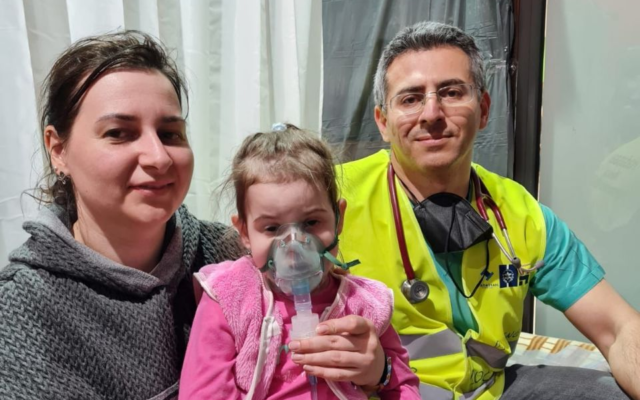

Yasinya and her 8-year-old brother are among the 4.3 million Ukrainian children that have been displaced since the Russians invaded over four weeks ago. That’s more than half of the country’s estimated 7.5 million child population, according to UNICEF.
But Yasinya’s situation is unique. She suffers from cystic fibrosis, a rare genetic disease that affects multiple organ systems, including the lungs, pancreas, liver, kidneys, and intestine. It requires a daily regimen of medication and treatment, but medical care has been hard to come by in Ukraine as Russian forces continue to bombard medical facilities.
Luckily, Yasinya found care at a hospital in neighboring Poland. And now one Israeli doctor is credited with saving her life.
A Life-Threatening Journey
Originally from Dnipro, Ukraine, Yasinya and her brother and mother were forced to flee Ukraine during the Russian invasion. Like many refugees, they made their way to Poland.
Because of her condition, Yasinya needs at least three sessions of assisted ventilation and respiratory physiotherapy in order to remove mucus from her lungs, which can make it hard to breathe.
Israeli Dr. Alex Gileles, a pediatric pulmonologist expert who specializes in treating children with acute and chronic lung diseases, was one of the providers that treated the young girl when she arrived at Hadassah Hospital located in the Polish city Przemyśl, close to the Ukrainian border. The clinic was set up by Israeli volunteers.
“When they first arrived at the clinic at the refugee camp, the mother described how she and her two children had spent five days on the roads without being able to treat the girl, which made her condition deteriorate and brought her to a real life-threatening situation,” Gileles told reporters.
“Luckily, they came here,” he said. “When we first met, the mother was extremely exhausted and worried about her daughter’s condition.”
Gileles said Yasinya’s lungs were completely blocked by the time she arrived at the hospital.
The medical team quickly provided her with medication to break up the mucus. Gileles remembers instructing her mother on the necessary physiotherapy for her daughter.
“It’s a super-rare disease,” he said. “A girl suddenly arrived at the clinic looking very sick. I asked what was wrong with her and was told she has cystic fibrosis. That’s my specialty! Being able to be there was a great privilege.”
After several days of treatment, Yasinya was finally able to sleep without struggling to breathe. Gileles and his team treated her again in the morning before the family boarded a train for Germany, where they will hopefully stay until the end of the war.
There are only 600 children in Ukraine suffering from Yasinya’s condition, according to Gileles, and that by chance, she came to a clinic where there was a specialist.
He also gave his contact information to the family in case they need his help later on.
“It felt like providence, he said.
Fleeing with a Terminal Illness
Gileles is one of many doctors and nurses treating refugees near the frontlines of the war. He has witnessed several tragic events over the last few weeks. The crisis has been particularly difficult for those with preexisting medical conditions that require regular care.
Yelena Buvana, a single mother with a terminal illness, found refuge at Hadassah Hospital after leaving Ukraine. She explained what it was like to flee while suffering from a medical condition.
“People say that when you have a terminal illness, you feel less pain tight before your death, and that’s what started happening to me,” Buvana explained. “I thought that I was about to die, and I wasn’t afraid of it. I was just scared for my little girl. I needed to figure out how to save her.”
Once Buvana and her 14-year-old daughter made it into Poland, they found themselves under the care of Dr. Gileles.
“She was barely walking,” Gileles said. “The story we got was that this woman has had terminal breast cancer for ten years.”
According to Buvana, she only had one surgery for her cancer and couldn’t afford chemotherapy. The pain was often so severe that she would faint once or twice a day.
Before the invasion, the doctors in Ukraine told her she only had a few weeks to live.
She decided to make the dangerous trek to Ukraine when she ran out of food for her daughter.
“I came here because I didn’t want my child to see death,” Buvana said. “In my city, there were constant alarms. It affects your nervous system.”
Gileles reached out to his organization to see if there was anything they could do to help her. He eventually got in touch with the First Lady of Poland who promised to take care of Buvana’s case personally. The Polish government found a nearby Ukrainian family that agreed to take the woman and her daughter in. She later went into the hospital for an initial assessment before receiving care.
“There was a time when I dreamed of dying because of the pain, but now I don’t hurt as much as before,” said Buvana. “I feel that I am alive again.”
In a shocking incident on December 4, 2024, Brian Thompson, the CEO of UnitedHealthcare, was…
In an unprecedented step toward financial relief and health equity, the city of St. Paul,…
In early November 2024, a shocking tragedy unfolded in Budapest, Hungary, as American nurse Mackenzie…
If Robert F. Kennedy Jr. were to assume leadership of the U.S. Food and Drug…
On November 1, 2024, federal authorities charged 38-year-old Rebecca Fadanelli, owner of Skin Beaute Med…
In a quaint little restaurant in Echo Park, an up and coming author is sitting…